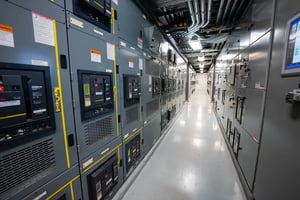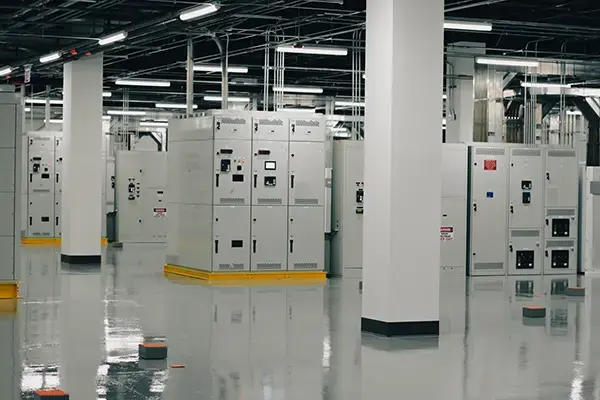
Lithium Ion in the Data Center?
Lithium ion batteries (li-ion) can provide the energy UPS systems need at lower total cost of ownership for data centers. Learn about the technical and practical advantages of li-ion.

For years, using li-ion batteries to power anything other than a remote-control car would have been considered a mistake. The chemical composition of li-ion batteries often varied drastically by manufacturer, making the batteries less reliable, stable, and safe overall — not exactly good justification for their significantly higher price tag. And with so many customers counting on data centers to deliver promised uptime, only the best, most reliable power sources could be utilized, which up until recently included VRLA (valve-regulated lead-acid) batteries.
But now, li-ion batteries are coming to the fore as a real solution for data center uninterruptable power supplies — in large part because manufacturers of consumer electronics, smartphones, and electric vehicles have pushed heavily for li-ion innovation and improvement, while VRLA technology hasn’t changed much in decades. The strides made with li-ion are paying off. It’s now predicted that by 2025, li-ion will increase to 35% of the market, up from just 1% in 2016.
As data centers everywhere seek to cut operating costs, become more efficient, and maximize space without sacrificing service or performance, they’re seeing the myriad benefits of the newest generation of li-ion batteries now available, which are proving to be more powerful, reliable, long-living, and cost-efficient, than their old VRLA predecessors.
Calculate Li-ion TCO Potential
Schneider Electric has developed a TCO calculator that estimates the potential cost savings realized by using li-ion batteries instead of VRLA batteries.
How batteries are used in data centers
Working in concert with rectifiers and inverters, batteries are the beating heart of a data center’s UPS, which operates as back-up in the event of a main power source failure to keep security systems, computers, and other electronic equipment running as expected. A battery failure could put the data center at risk of a power interruption that can bring down operations and potentially lose millions of dollars for the business and its customers.
Because battery systems themselves are made of many interconnected parts — cells, cables and more — all of which can erode and affect the performance of the battery, data centers have to monitor battery health, store and handle them safely, accurately predict future failure and replace them before failure occurs.
This critical dependency on monitoring and maintenance has to be factored into the investment when data centers decide what type of battery to use. And although well-maintained VRLA batteries have done the job for nearly as long as the data center industry has existed, all of that is changing.
Advantages of lithium ion batteries
Top manufacturers of li-ion batteries are now making them specifically for data centers that were previously using VRLA batteries, helping them make the switch and reap a number of benefits to business — benefits which in turn get passed on to data center customers via enhanced service, competitive pricing, greater reliability and other factors:
- Lower cost of operations. While the initial cost of a li-ion battery may be higher than a VRLA battery, the total cost of operation ends up much less over time, saving organizations 30-50%.
- Fewer refreshes. The life expectancy of a li-ion battery is 15 years, as opposed to just five years for a VRLA battery, resulting in fewer battery refreshes.
- Less risk. With fewer li-ion battery refreshes required, the risk of incidents during battery replacement work is lower as well, meaning higher reliability.
- Smaller footprint. With 60-70% less weight than a VRLA battery and 40-60% less size overall, the footprint of a li-ion battery is much smaller, giving data centers more floor space for data and IT management.
- Less time to charge. A typical li-ion battery can be fully recharged in about two hours, unlike a VRLA battery that requires 10-12 hours.
- Reduced cooling costs. Li-ion batteries are designed to safely operate at higher temperatures with much less degradation than VRLA, allowing data centers to cut down on cooling investments for gray spaces.
- Less need for trickle charging. The shelf life of li-ion batteries is more than two years, which means that data centers don’t need to trickle charge the batteries during lengthy or protracted construction projects. During normal operations much less energy is used to maintain battery charge as well, reducing energy cost further.
Li-ion battery safety and maintenance
As with the use of any battery, safety has to be a top priority for data centers. Transitioning to li-ion batteries from VRLA brings important safety considerations:
- Balance. Manufacturing high-density batteries like li-ion requires balance, both in the structure of the battery itself and in the composition and proportion of chemicals that are used. This significantly reduces the risk of failure and corrects the chemical imbalances that plagued some li-ion batteries of the past.
- Ease of handling. Li-ion batteries weigh less than VRLA batteries and are much safer for employees to pick up, move and handle.
- Comprehensive monitoring and management. Li-ion batteries are monitored and managed at the system, rack, module and cell level to ensure top performance and help predict and prevent failure at any level with both active and passive enhanced safety features.
Lithium Ion: Well-known batteries, new expectations
Data center organizations like CoreSite live at the crossroads of new inventions and enhanced technologies, and while this allows them to stay competitive, they also have to be relentlessly rigorous in how they approach any new technology to make sure it doesn’t negatively impact service or performance.
With the latest innovations and improvements around li-ion batteries, and working together with Schneider Electric on ensuring safety is built into every level, CoreSite is excited to continue researching and testing out the technology, hopeful to realize the benefits of constant innovation.
Get in touch today to learn more about how CoreSite and its partners are innovating to deliver operational excellence for customers.










